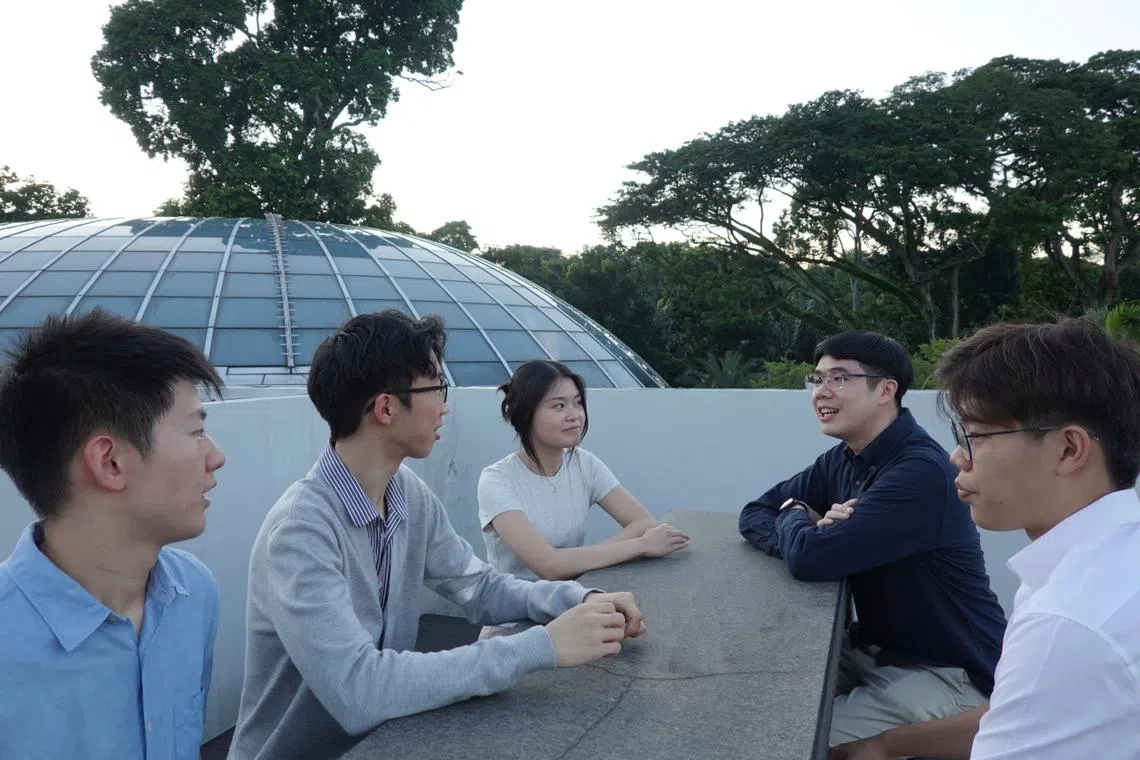BRANDED CONTENT
askST: How can a university education prepare me for the workforce?
One university says its interdisciplinary approach and comprehensive career support are yielding results

Universities in Singapore are responding to the changing needs of the workforce with different ways of teaching and learning.
PHOTO: GETTY IMAGES
As technology reshapes industries, the question arises: Is a traditional university education enough to prepare students for today’s real-world upheaval?
Surveys like the 2023 Economist Impact research on skills gap point to shifts in what employers value most in workers; they are increasingly prioritising soft skills like adaptability and critical thinking, highlighting the need for education systems to adapt.
Universities in Singapore are responding with different ways of teaching and learning. The Singapore Management University (SMU), for example, is focusing on an interdisciplinary approach and comprehensive career support to prepare students for the workforce.
More than 92 per cent of its graduates in 2023 secured jobs within six months of completing their final examinations, according to the annual Joint Autonomous Universities Graduate Employment Survey
This exceeds the 89.6 per cent average across four universities – SMU, the National University of Singapore, Nanyang Technological University and the Singapore University of Social Sciences. The graduates were surveyed by the four universities in November 2023.
The same survey noted that SMU graduates command a mean starting salary of around $4,890.
Q: I’m worried about how quickly the workplace is changing. How can a university education help me get a job after I graduate?
A: The global economy has indeed been changing, acknowledges Ms Linette Lim, Director of Admissions and Financial Assistance, SMU.
That’s why the university is focusing on nurturing “confident, adaptable and future-ready individuals”, she says, through real-world experience and interdisciplinary learning.
“Our experiential learning programmes like SMU-X provide students with the chance to work on real-world challenges, guided by industry mentors.”
SMU-X is open to students from all schools and disciplines. It has partnered with over 1,000 organisations since its launch in 2015.
All undergraduates must also complete a compulsory 10-week internship programme either in Singapore or overseas, says Ms Lim, for more exposure to challenges of a fast-evolving world.
The university’s core curriculum, introduced in 2019, is structured around fundamental competencies that can be applied across industries and job roles, with diverse course units from modes of thinking to ethics.
First-year computer science student Ernest Ng, 22, appreciates this interdisciplinary approach.
It enables him to not only learn about computer science, he says, but also explore how he can apply it to real-world problems he cares about, like sustainability. “I feel the best ideas come from connecting different fields,” he says.
The university also provides comprehensive career support to help its graduates be “job-ready from day one”, says Ms Lim.
The SMU’ Dato Kho Hui Meng Career Centre offers undergraduates and graduates personalised career services, including guidance, workshops, networking, and job search resources, she says.
Q: I hear a lot about experiential learning, but what does this mean for my day-to-day university life? What can I look forward to besides lectures and assignments?
A: Learning extends well beyond the classrooms, says Ms Lim. All students at SMU are guaranteed at least one overseas experience, whether it’s through exchange programmes, internships, community service programmes, study missions, summer school or overseas projects via SMU-X. The goal is to “nurture them to be global citizens”.
The university maintains small seminar-style classes of about 45 students on average, she says, to “foster an interactive environment where students receive individual attention and learn to be confident and articulate”.

First-year computer science undergraduate Ernest Ng (second from left) says learning through an interdisciplinary approach enables him to explore applying what he learns to real-world problems.
PHOTO: SMU .HACK
For undergraduate Mr Ng, this environment has helped him overcome his fear of public speaking. The small classes ensure “more personalised mentorship” and have given him confidence to step up in initiatives outside the classroom.
This includes the SMU Project HeartCode 2024, a community service project organised by SMU’s School of Computing and Information Systems, where he mentored underprivileged youth, exploring tech-driven solutions to real-world problems.
Mr Ng, who is passionate about using automation to improve lives, feels that the university “provides a lot of opportunities for students like me to carve my own path”.
“It helps spark your sense of possibility,” he says. For example, he recently worked with a professor on a research that explores the use of artificial intelligence chat bot ChatGPT to automate grading. It was an opportunity that arose simply because he expressed interest.
Q: The opportunities sound great, but I’m worried about the cost. What if my family can’t afford it?
A: There are resources available, including government bursaries and loans. One example is the Ministry of Education’s Tuition Fee Loan, which can cover up to 90 per cent of your subsidised tuition fees, with up to 20 years for loan repayment.
You can also approach the university you are accepted into, and ask about the financial assistance available.
“We understand that financial constraints can be a barrier for some students,” says Professor Lily Kong, President of SMU. “This is why SMU offers a wide range of financial aid options and merit-based scholarships.”
Earlier this month, the university introduced SMU Access Plus
This includes financial assistance with living allowances and global learning experiences, says Prof Kong, to ensure “that financial challenges do not prevent anyone from pursuing a transformative education”.
Based on per capita income and citizenship criteria, the scheme aims to benefit over 3,000 students annually.
In partnership with Singapore Management University


